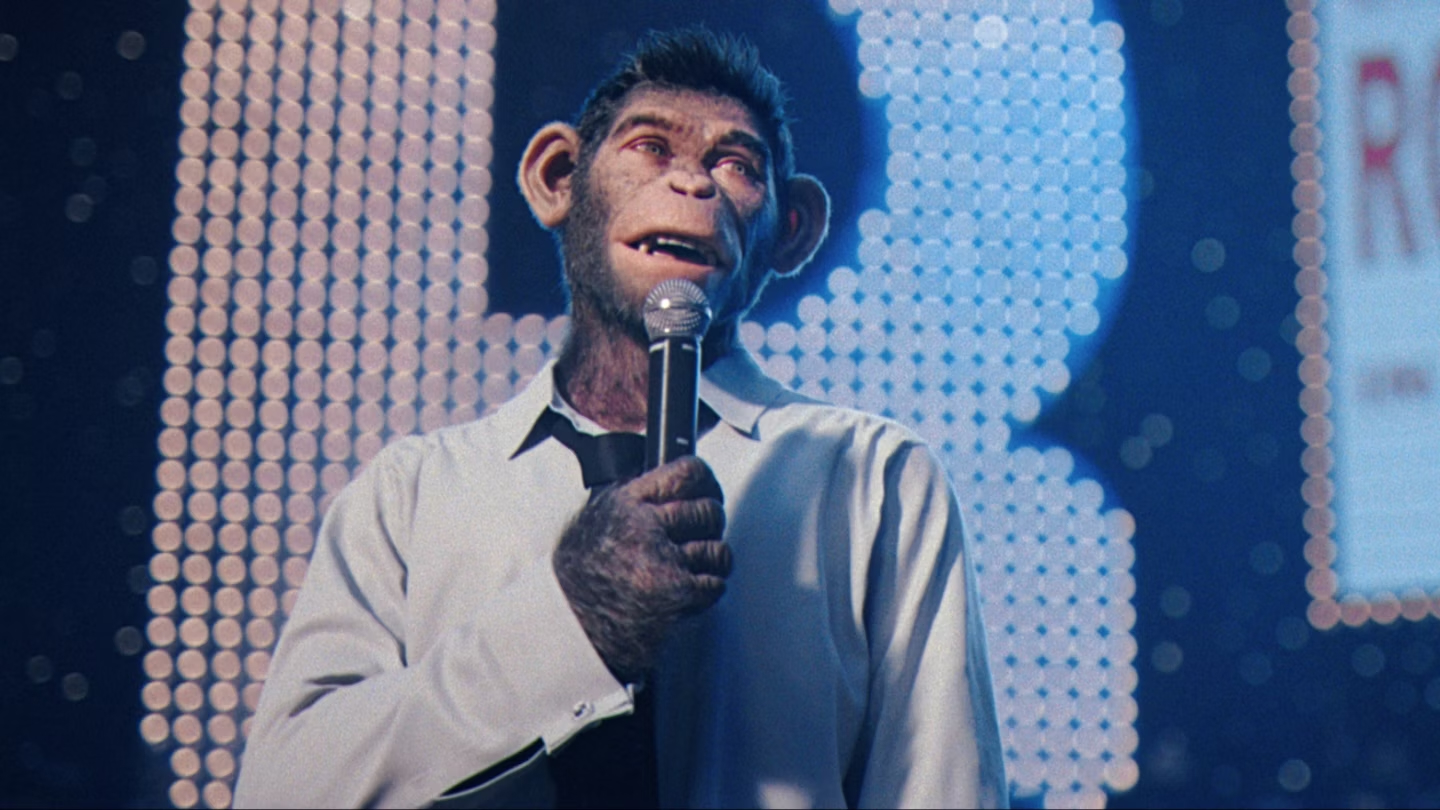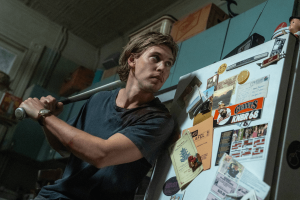
… But why is he a monkey? It’s the inevitable question asked by any person who has seen the trailer, or for that matter a TikTok reel, of Better Man, the new left-handed biopic about British pop star Robbie Williams. And even as one begins watching this sardonic portrait of the ‘90s pop music scene in the UK, it’s still not immediately clear why the creative choice was made.
Director Michael Gracey has told the press it’s simply due to recognizing how Williams sees himself: a dancing monkey bounding around the stage for our entertainment. Yet there is more at work than that SNL logline to justify the film’s expensive, and eerily convincing, Wētā CGI effects. The gimmick grabs the attention, obviously, flashing a quirky eccentricity in furry neon. At an instant, the film is stood apart from other glossy and by-the-numbers portraits of beloved, or at least fondly remembered, musical stars. (See: the Bob Dylan paean playing on the screen next door for more).
Still, Gracey and his co-writers, which include Simon Gleeson and Oliver Cole, are angling to do more than take the piss out of Williams. After all, they have not only his blessing, but also his presumably intimate support with Williams acting as an executive producer on the film and credited as doing some of the performance used to create the digital monkey (or humanoid ape of the Rod Serling variety if we want to get technical). One imagines Williams embraces this whimsical flourish partially because it reinforces the self-deprecating image the singer paints of himself. Right until the closing scene, his voiceover narration insists his success is due to merely being the most extravagant cabaret act in Britain. Fair enough, but the oddball choice also gives Better Man more teeth than you normally anticipate from this kind of movie.
This isn’t (only) a fawning tribute to a pop culture curio; it’s also a film eager to visually and constantly remind you of its subject matter’s self-loathing. And the most impressive thing about the Wētā effects is how quickly they come to appear as natural. The viewing eye eventually forgets to look for the wires. But even as the technique becomes seamless, it continues to provide an unwavering, if subliminal, message about the bottomless self-disgust necessary to fuel Williams’ mannered “cheek,” not to mention the drug habit that nearly killed him.
The concept is ultimately a high-tech promise that this is a movie which wishes to keep the warts of its star, internal though they might usually be, visible at all times. In theory, it gives heft to what amounts to another celebrity’s poor little rich boy problems after he gets big by the top of Act Two. Your mileage might vary whether it succeeds at having and eating that cake, but at least it makes the concept of such a dessert in a multiplex overstuffed with bakeries seem novel.
Otherwise, the film is mostly the rags-to-riches story you might expect, especially if you are old enough to remember VH1’s Behind the Music portraits of various pop stars. Williams is introduced as an ape born to a human father who is far more boorish than the primate child could ever be: Peter Williams (Steve Pemberton). Peter trains his son to believe that you are either born with “it” or not. Frank Sinatra had “it.” Dean Martin too. Daddy also thinks he has it, even though he walks out on his son before he’s 10 years old so as to pursue a career as a failed pub comic.
This is presumably the kernel of Robert’s desperate need to please, and to punish the animal within. While still being lovingly raised by his mother (Kate Mulvany) and grandmother (Alison Steadman), adolescent Robert (Jonno Davies for presumably most of the movie in a motion-capture suit) yearns to ditch them as soon as possible and become a member of the early ‘90s boy band, Take That. It’s this musical act that turns Robert into “Robbie,” and which is depicted as far more humiliating with their short-shorts and banal cafeteria-club music than any cartoonish monkey business could be. Robbie of course abruptly sunders that relationship as well after bristling at the creative monotony of being a glorified backup dancer—a fate quickly commuted when the other members of Take That kick him out.
What follows is a usual laundry list of musical biopic beats: struggle cut short by sudden “overnight” success; the girlfriend whose life Williams would become a drain on, here personified by fellow pop star Nicole Appleton (Raechelle Banno); a few other musical cameos that will have audiences chuckling, including a vicious but probably deserved dig at Oasis front man Liam Gallagher (Leo Harvey-Elledge); and Robbie’s inevitable bottoming out. But the intelligence of Better Man’s script is how flippant it is. Not only does it go bananas with Williams’ appearance, but even bits like the inevitable climactic “concert of the star’s life” proving not to be any climax at all as Robbie spends it high as a kite and haunted by visions of his younger self as a baby primate and adolescent twerker stalking him in the audience like the Ghosts of Christmas Past.
It is ultimately Better Man’s recognition that audiences know the beats they’re walking through, and its eagerness to lightly play with them, if never truly subvert them, which gives Gracey’s movie rhythm. It might only be dancing to a familiar hook designed for maximum radio play (or Spotify today), but it uses those same chords well.
Mostly though it benefits from the obvious novelty of the effects. While the marketing and press has blurred how much of the performance in the movie is young Davies, how much is the real-life Williams, and/or whether most of it should be credited to the digital artists at Wētā, the end result is nonetheless effective; cumulatively, it lulls you into pitying this poor put-upon beastie. The combined artistic efforts never once turn into Barnum and Bailey pantomime, even in scenes of Williams dancing with Banno’s Appleton before a sea of fireworks. Instead you become invested in the animated character’s plight as he deals with real demons like regret over the loss of a grandparent, or the complicated resentments that come from a fiancée being pressured by her record label into getting an abortion.
Yet that circus analogy still holds across the film, not least of all because Garcey’s last film was the P.T. Barnum hokum, The Greatest Showman. Better Man is definitely a more successful narrative and character study than that collection of Top 40-ready bangers in search of a plot. The monkey CGI is just the beginning of a film unafraid to actually depict its musical god as also a real devil. But whether Williams is truly man or beast, three-dimensional or a phenomenal cartoon approximation, he is still the only character with any depth in this movie.
The film’s various musical sequences, which do break into pure fantasy, are more ambitious than something as shallow and devoid of insight as, say, Bohemian Rhapsody, but all its self-flagellation still uncannily feels like an act; something an entertainer does to ingratiate the crowd. One senses the real Williams, executive producer that he is, still maintains a steady hand over what we see and what we do not. We get a good hard look at his charisma, and his complicated feelings about it, but everything else is still as glossed over as a montage vaguely acknowledging their protagonists’ habitual infidelity.
Even so, there’s a real bittersweet soul here, and a sense that both the film and its protagonist is searching for some kind of authenticity so rarely seen in a genre where most movies become little better than carefully curated playlists. Better Man is not the surface level pop star commercial most standard biopics are, or even the rather similarly innovative Piece by Piece was earlier this year. That Parallel Williams documentary, which was filmed as a standard doc but then animated over with CGI LEGOs, also used novelty to couch what is little better than advocacy filmmaking.
Better Man and Williams, however, prove more ambitious and happy to admit this guy was (and is?) a complete animal. He did drugs, sabotaged every important relationship in his life, went through painfully adult crises with his signifcant other, and missed his grandmother’s last days. He also provided us with a film that is often, if inconsistently, audacious and worthwhile. It even looks spectacular during the bits where it just plays the hits.
Better Man opens in limited released on Dec. 25 and nationwide in the U.S. on Jan. 17. It opens nationwide in the UK on Dec. 26. Learn more about Den of Geek’s review process and why you can trust our recommendations here.
The post Better Man Review: A Musical Biopic Brave Enough to Monkey with the Formula appeared first on Den of Geek.









